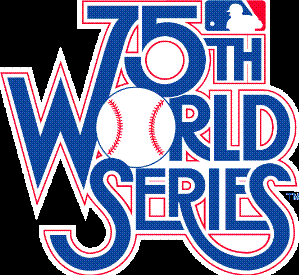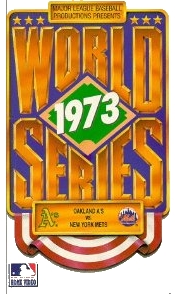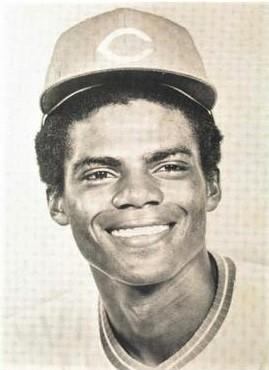
The 1975 World Series was the championship series of Major League Baseball's (MLB) 1975 season. The 72nd edition of the World Series, it was a best-of-seven playoff played between the American League (AL) champion Boston Red Sox and the National League (NL) champion Cincinnati Reds. The Reds won the series, four games to three. In 2003, ESPN ranked it the second-greatest World Series ever played, trailing only the 1991 series, while in 2020, Sam Miller of ESPN named it the best World Series ever.
The Jeffrey Maier incident was an incident during Game 1 of the 1996 American League Championship Series between the New York Yankees and the Baltimore Orioles. Twelve-year-old Jeffrey Maier deflected a batted ball, hit by Derek Jeter, into the Yankee Stadium stands for what umpires ruled to be a home run, rather than fan interference. His interference altered the course of Game 1, as the resulting home run allowed the Yankees to tie the score. They emerged victorious from the game and won the series four games to one en route to winning the World Series.
In baseball, interference occurs in situations in which a person illegally changes the course of play from what is expected. Interference might be committed by players on the offense, players not currently in the game, catchers, umpires, or spectators. Each type of interference is covered differently by the rules.
In baseball, obstruction is when a fielder illegally hinders a baserunner running within the basepath. Baserunners are generally permitted to run from base to base without being physically blocked or hindered by a fielder. The only time that a fielder is not obligated to "get out of the way" of a baserunner is when the fielder is fielding a hit ball or in possession of the ball.

The 1978 World Series was the championship series of Major League Baseball's (MLB) 1978 season. The 75th edition of the World Series, it was a best-of-seven playoff played between the American League (AL) champion New York Yankees and the National League (NL) champion Los Angeles Dodgers. In a rematch of the previous year's World Series, the Yankees won, four games to two, to repeat as champions and to win their 22nd World Series. As of 2023, it remains the most recent World Series to feature a rematch of the previous season's matchup.

The 1973 World Series was the championship series of Major League Baseball's (MLB) 1973 season. The 70th edition of the World Series, it was a best-of-seven playoff played between the American League (AL) champion Oakland Athletics and the National League (NL) champion New York Mets. The Athletics won the series in seven games for their second of three consecutive World Series titles and their seventh championship overall.
The 1972 World Series was the championship series of Major League Baseball's (MLB) 1972 season. The 69th edition of the World Series, it was a best-of-seven playoff between the American League champion Oakland Athletics and the National League champion Cincinnati Reds. The Athletics won in seven games for their sixth World Series championship. It was the first World Series championship for the Athletics since 1930.
The 1969 World Series was the championship series of Major League Baseball's (MLB) 1969 season. The 66th edition of the World Series, it was a best-of-seven playoff between the American League (AL) champion Baltimore Orioles and the National League (NL) champion New York Mets. The Mets won the series, four games to one, to accomplish one of the greatest upsets in Series history, as that particular Orioles team was considered to be one of the finest ever. The World Series win earned the team the sobriquet "The Miracle Mets". This was the first World Series of MLB's divisional era.

Anthony Christopher Kubek is an American former professional baseball player and television broadcaster. During his nine-year playing career with the New York Yankees, Kubek played in six World Series in the late 1950s and early 1960s, starting in 37 World Series games. For NBC television, he later broadcast twelve World Series between 1968 and 1982, and fourteen League Championship Series between 1969 and 1989. Kubek received the Ford C. Frick Award in 2009.

Edison Rosanda Armbrister was a Bahamian professional baseball player. He played in Major League Baseball as an outfielder from 1973 to 1977 for the Cincinnati Reds. Armbrister was a utility player for the Reds team known as the Big Red Machine that won three National League pennants and two World Series championships between 1973 and 1976. He was inducted into the Bahamas National Hall of Fame in 2008.

Jerry Blake Layne is an American umpire in Major League Baseball who has worked in the National League between 1989 and 1999, and throughout both major leagues since 2000. He wore uniform number 24 in the NL, but when MLB merged the AL and NL umpiring staffs in 2000, Layne was forced to switch to number 26, as AL umpire Al Clark, who also wore 24, had more seniority. When Clark was fired midway through the 2001 season by MLB, Layne reclaimed number 24 and has worn it ever since. With Joe West's retirement in 2022, Layne became MLB's most senior active umpire.

James Arthur Willoughby is a former pitcher in Major League Baseball who played from 1971 through 1978 for the San Francisco Giants, Boston Red Sox and Chicago White Sox. Listed at 6 ft 2 in (1.88 m) and 185 lb (84 kg), he batted and threw right handed.
Richard Raul Garcia is an American former umpire in Major League Baseball (MLB) who worked in the American League (AL) from 1975 to 1999. Garcia wore uniform number 19 when the AL adopted numbers for its umpires in 1980.

Frank Victor Pulli was a professional baseball umpire, working in the National League from 1972 until 1999. He umpired many postseason games, including four World Series. Pulli wore uniform number 14 during his career.
David Leroy "Satch" Davidson was a Major League Baseball umpire in the National League from 1969 to 1984. During his career, Davidson was behind the plate for Hank Aaron's 715th home run which broke Babe Ruth's career record and he called the game in which Carlton Fisk hit a game-winning home run in game 6 of the 1975 World Series. Davidson wore uniform number 4 when the National League adopted umpire uniform numbers in 1970.

Samuel Woodford Holbrook is an American retired Major League Baseball umpire. He made his MLB debut in 1996 and was promoted to crew chief in 2017. Holbrook worked the World Series in 2010, 2016, and 2019. He retired following the 2022 season.
By 1969, Major League Baseball had grown to 24 teams and the net local TV revenues had leaped to $20.7 million. This is in sharp contrast to 1950 when local television brought the then 16 Major League clubs a total net income of $2.3 million. Changes baseball underwent during this time, such as expansion franchises and increasing the schedule from 154 games to 162, led to a wider audience for network and local television.
Carlton Fisk's 1975 World Series home run was a baseball play that occurred in Game 6 of the 1975 World Series on October 21, 1975, at Fenway Park in Boston, Massachusetts. The Boston Red Sox defeated the Cincinnati Reds, 7–6, forcing a deciding seventh game, when Carlton Fisk hit a home run in the 12th inning home run to cap off what many consider to be the best World Series game ever played.
The following article details the history of Major League Baseball on NBC, the broadcast of Major League Baseball games on the NBC television network.
The 1970 Major League Baseball postseason was the playoff tournament of Major League Baseball for the 1970 season. The winners of each division advance to the postseason and face each other in a League Championship Series to determine the pennant winners that face each other in the World Series.









